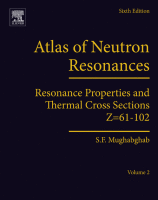Browse content
Table of contents
Actions for selected chapters
- Full text access
- Book chapterAbstract only
Chapter 1 - Thermal Cross Sections
Pages 1-19 - Book chapterAbstract only
Chapter 2 - Resonance Properties
Pages 21-54 - Book chapterAbstract only
Chapter 3 - Individual Resonance Parameters
Pages 55-86 - Book chapterAbstract only
Chapter 4 - Notation and Nomenclature
Pages 87-102 - Book chapterNo access
Bibliography
Pages 103-110 - Book chapterNo access
Recommended Thermal Cross Sections, Resonance Properties, and Resonance Parameters for Z = 61–102
Pages 111-679
About the book
Description
Atlas of Neutron Resonances: Resonance Properties and Thermal Cross Sections Z=61-102, Sixth Edition, contains an extensive list of detailed individual neutron resonance parameters for Z=61-102, thermal cross sections, capture and fission resonance integrals, average resonance parameters, and a short survey of the physics of thermal and resonance neutrons. The long introduction contains: nuclear physics formulas aimed at neutron physicists; topics of special interest such as valence neutron capture, nuclear level density parameters, and s-, p-, and d-wave neutron strength functions; and various comparisons of measured quantities with the predictions of nuclear models, such as the optical model neutron-induced fission.
As in the last edition, additional features have been added to appeal to a wider spectrum of users. These include: spin-dependent scattering lengths that are of interest to solid-state physicists, nuclear physicists and neutron evaluators; calculated and measured Maxwellian average 5-keV and 30-keV capture cross sections of importance to astrophysicists involved in nucleosynthesis modeling; s-, p-, and d- wave average radiative widths; nuclear level density parameters; and average fission widths derived from average fission cross sections.
Atlas of Neutron Resonances: Resonance Properties and Thermal Cross Sections Z=61-102, Sixth Edition, contains an extensive list of detailed individual neutron resonance parameters for Z=61-102, thermal cross sections, capture and fission resonance integrals, average resonance parameters, and a short survey of the physics of thermal and resonance neutrons. The long introduction contains: nuclear physics formulas aimed at neutron physicists; topics of special interest such as valence neutron capture, nuclear level density parameters, and s-, p-, and d-wave neutron strength functions; and various comparisons of measured quantities with the predictions of nuclear models, such as the optical model neutron-induced fission.
As in the last edition, additional features have been added to appeal to a wider spectrum of users. These include: spin-dependent scattering lengths that are of interest to solid-state physicists, nuclear physicists and neutron evaluators; calculated and measured Maxwellian average 5-keV and 30-keV capture cross sections of importance to astrophysicists involved in nucleosynthesis modeling; s-, p-, and d- wave average radiative widths; nuclear level density parameters; and average fission widths derived from average fission cross sections.
Key Features
- Provides a comparison of average resonance parameters with optical model calculations and with the generalized Landau-Fermi model
- Presents scattering radii for various partial waves from the analysis of total neutron cross sections in the keV to MeV energy region
- Includes a brief review of sub-threshold fission
- Features consistent treatment of average neutron parameters with values from the resolved resonance region
- Provides a comparison of average resonance parameters with optical model calculations and with the generalized Landau-Fermi model
- Presents scattering radii for various partial waves from the analysis of total neutron cross sections in the keV to MeV energy region
- Includes a brief review of sub-threshold fission
- Features consistent treatment of average neutron parameters with values from the resolved resonance region
Details
ISBN
978-0-444-63786-4
Language
English
Published
2018
Copyright
Copyright © 2018 Elsevier B.V. All rights reserved.
Imprint
Elsevier Science
